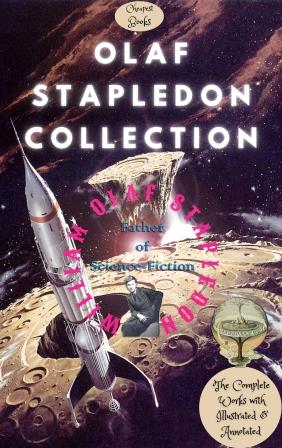William Olaf Stapledon (10 May 1886 – 6 September 1950) – known as Olaf Stapledon – was a British philosopher and author of science fiction. In 2014, he was inducted into the Science Fiction and Fantasy Hall of Fame.
Stapledon was born in Seacombe, Wallasey, on the Wirral Peninsula in Cheshire, the only son of William Clibbett Stapledon and Emmeline Miller. The first six years of his life were spent with his parents at Port Said, Egypt. He was educated at Abbotsholme School and Balliol College, Oxford, where he acquired a BA degree in Modern History (Second Class) in 1909, promoted to an MA degree in 1913. After a brief stint as a teacher at Manchester Grammar School he worked in shipping offices in Liverpool and Port Said from 1910 to 1912. From 1912 to 1915 Stapledon worked with the Liverpool branch of the Workers' Educational Association.
During the First World War he served as a conscientious objector. Stapledon became an ambulance driver with the Friends' Ambulance Unit in France and Belgium from July 1915 to January 1919; he was awarded the Croix de Guerre for bravery. His wartime experiences influenced his pacifist beliefs and advocation of a World Government. On 16 July 1919 he married Agnes Zena Miller (1894–1984), an Australian cousin. They had first met in 1903, and later maintained a correspondence throughout the war. They had a daughter, Mary Sydney Stapledon (1920–2008), and a son, John David Stapledon (1923–2014). In 1920 they moved to West Kirby.
Stapledon was awarded a PhD degree in philosophy from the University of Liverpool in 1925 and used his doctoral thesis as the basis for his first published prose book, A Modern Theory of Ethics (1929). However, he soon turned to fiction in the hope of presenting his ideas to a wider public. The relative success of Last and First Men (1930) prompted him to become a full-time writer. He wrote a sequel, Last Men in London, and followed it up with many more books of both fiction and philosophy.
For the duration of the Second World War Stapledon abandoned his pacifism and supported the war effort. In 1940 the Stapledon family built and moved into a new house on Simon's Field, in Caldy, in Wirral. During the war Stapledon become a public advocate of J. B. Priestley and Richard Acland's left-wing Common Wealth Party, as well as the British internationalist group Federal Union.
After 1945 Stapledon travelled widely on lecture tours, visiting the Netherlands, Sweden and France, and in 1948 he spoke at the World Congress of Intellectuals for Peace in Wrocław, Poland. He attended the Conference for World Peace held in New York City in 1949, the only Briton to be granted a visa to do so. In 1950 he became involved with the anti-apartheid movement. After a week of lectures in Paris, he cancelled a projected trip to Yugoslavia and returned to his home in Caldy, where he died very suddenly of a heart attack.
Stapledon was cremated at Landican Crematorium. His widow and their children scattered his ashes on the sandy cliffs overlooking the Dee Estuary, a favourite spot of his that features in more than one of his books. Stapledon Wood, on the south-east side of Caldy Hill, is named after him.
Fictions of Stapledon:
Last and First Men: A Story of the Near and Far Future (1930)
Last Men in London (1932)
Odd John: A Story Between Jest and Earnest (1935)
Star Maker (1937)
Darkness and the Light (1942)
Old Man in New World (short story, 1944)
Sirius: A Fantasy of Love and Discord (1944)
Death into Life (1946)
The Flames: A Fantasy (1947)
A Man Divided (1950)
Four Encounters (1976)
Nebula Maker (drafts of Star Maker, 1976)
East is West (posthumous, 1979)
Non-fiction Books:
A Modern Theory of Ethics: A study of the Relations of Ethics and Psychology (1929)
Waking World (1934)
Saints and Revolutionaries (1939)
New Hope for Britain (1939)
Philosophy and Living, 2 volumes (1939)
Beyond the "Isms" (1942)
Seven Pillars of Peace (1944)
Youth and Tomorrow (1946)
Interplanetary Man? (1948)
The Opening of the Eyes (ed. Agnes Z. Stapledon, 1954)

